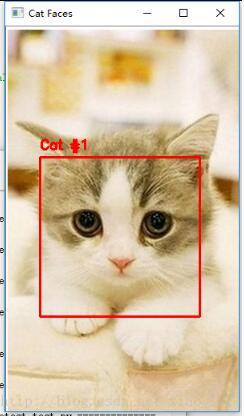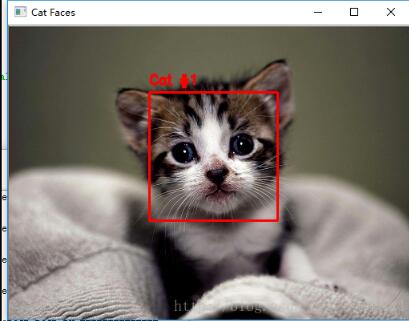python 小猫检测,通过调用opencv自带的猫脸检测的分类器进行检测。
分类器有两个:haarcascade_frontalcatface.xml和
haarcascade_frontalcatface_extended.xml。可以在opencv的安装目录下找到
d:\program files\opencv320\opencv\sources\data\haarcascades
小猫检测代码为:
1. 直接读取图片调用
|
1
2
3
4
5
6
7
8
9
10
11
12
13
14
15
16
17
18
19
20
21
22
|
import cv2image = cv2.imread("cat_04.png")gray = cv2.cvtcolor(image, cv2.color_bgr2gray)# load the cat detector haar cascade, then detect cat faces# in the input imagedetector = cv2.cascadeclassifier("haarcascade_frontalcatface.xml")#haarcascade_frontalcatface_extended.xmlrects = detector.detectmultiscale(gray, scalefactor=1.1, minneighbors=10, minsize=(100, 100))# loop over the cat faces and draw a rectangle surrounding eachprint (enumerate(rects))for (i, (x, y, w, h)) in enumerate(rects): cv2.rectangle(image, (x, y), (x + w, y + h), (0, 0, 255), 2) cv2.puttext(image, "cat #{}".format(i + 1), (x, y - 10), cv2.font_hershey_simplex, 0.55, (0, 0, 255), 2) print (i, x,y,w,h)# show the detected cat facescv2.imshow("cat faces", image)cv2.waitkey(1) |
检测效果:

2. 通过命令控制符调用
也可以通过调用argparse库,进行整体调用
新建cat_detect.py文件
|
1
2
3
4
5
6
7
8
9
10
11
12
13
14
15
16
17
18
19
20
21
22
23
24
25
26
27
28
29
30
31
32
33
34
35
36
37
|
# import the necessary packagesimport argparseimport cv2# construct the argument parse and parse the argumentsap = argparse.argumentparser()ap.add_argument("-i", "--image", required=true, help="path to the input image")ap.add_argument("-c", "--cascade", default="haarcascade_frontalcatface_extended.xml", help="path to cat detector haar cascade")args = vars(ap.parse_args())#"haarcascade_frontalcatface_extended.xml",# load the input image and convert it to grayscale#image = cv2.imread(args["image"])image = cv2.imread(args["image"])gray = cv2.cvtcolor(image, cv2.color_bgr2gray)# load the cat detector haar cascade, then detect cat faces# in the input imagedetector = cv2.cascadeclassifier(args["cascade"])rects = detector.detectmultiscale(gray, scalefactor=1.1, minneighbors=10, minsize=(120, 120)) # cat good# loop over the cat faces and draw a rectangle surrounding eachprint (enumerate(rects))for (i, (x, y, w, h)) in enumerate(rects): cv2.rectangle(image, (x, y), (x + w, y + h), (0, 0, 255), 2) cv2.puttext(image, "cat #{}".format(i + 1), (x, y - 10), cv2.font_hershey_simplex, 0.55, (0, 0, 255), 2)# show the detected cat facescv2.imshow("cat faces", image)cv2.waitkey(0) |
通过“命令控制符”调用
|
1
2
3
|
cmdcd e:\work\py\detectcate:\work\py\detectcat>python cat_detector.py --image cat_07.png |

以上就是本文的全部内容,希望对大家的学习有所帮助,也希望大家多多支持服务器之家。
原文链接:https://blog.csdn.net/xiao_lxl/article/details/77191145










